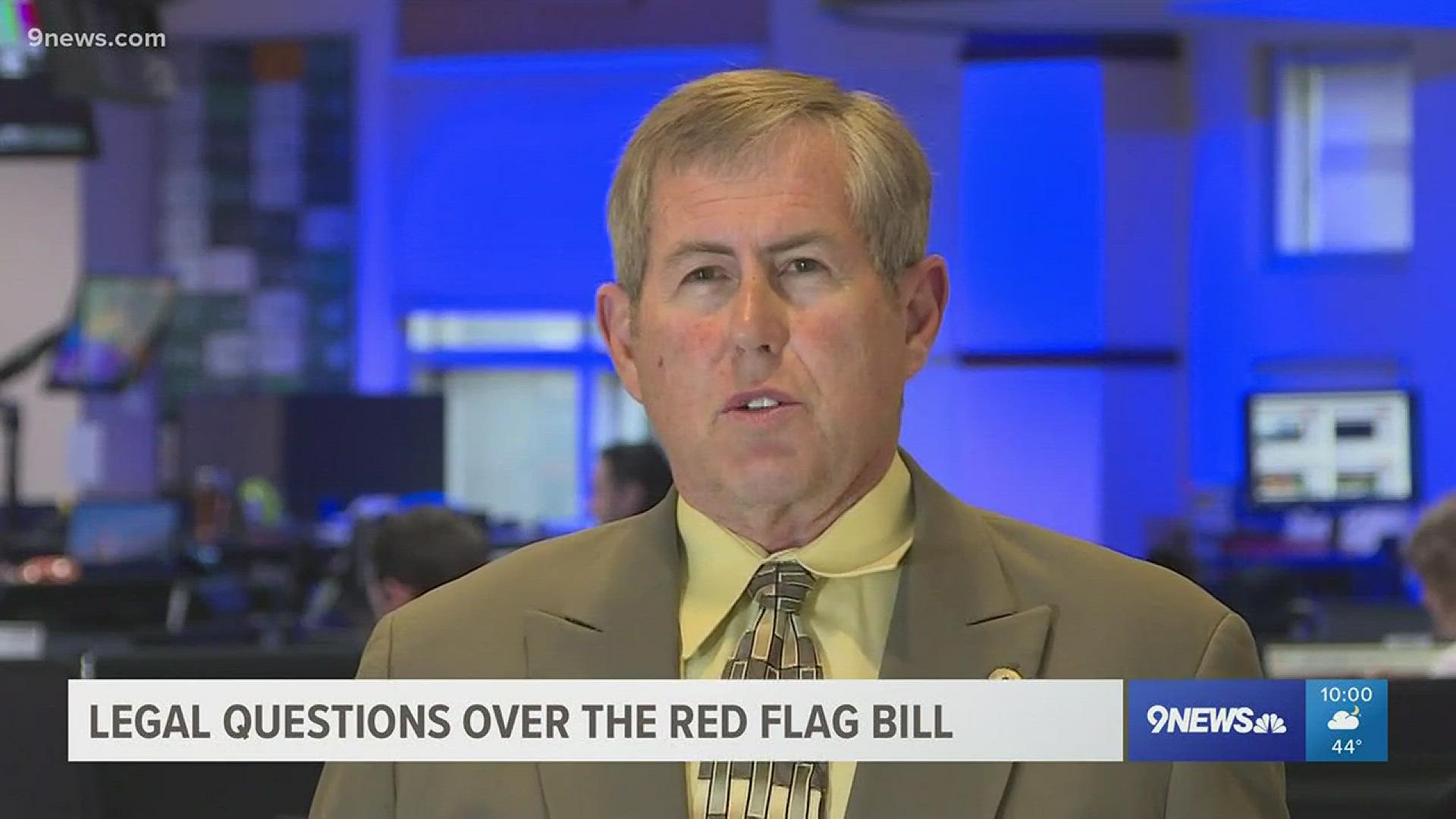DENVER — The Colorado House has given final approval to the controversial "red flag" gun bill.
The bill would allow the seizure of weapons from persons the court deems to pose a significant risk to themselves or others.
The 38-25 passing vote included two Democrats who voted against it: Rep. Bri Buentello (D-Pueblo) and Rep. Donald Valdez (D-La Jara).
The bill now heads to Gov. Jared Polis' desk, where his signature will make it law.
Colorado Republicans defeated a similar bill last year, insisting it infringed on citizens' Second Amendment rights. But Democrats won both statehouse chambers in November, and Polis called for a "red flag" law while campaigning last year.
It would allow family or law enforcement to seek a court order to have guns seized if they believe the owner is a threat. If approved, a subsequent court hearing would be held to determine whether to extend the seizure, up to 364 days.
Over the weekend, Republican Weld County Sheriff Steve Reams became nationally known from a CNN article headlined: "This Colorado Sheriff is willing to go to jail rather than enforce a proposed gun law."
"That reads well, I guess, in some circles, but that's the absolute last thing that I would like to see happen, for obvious reasons," Reams told Next.
Reams has been outspoken saying he is not willing to enforce a search warrant to go into someone's home and take their guns away.
So what would happen if he didn't and that person harmed themselves or others?
"Whether there's liability to be incurred, I don't know that you can say that about the use or the non-use of the 'red flag' bill, a person is still accountable for their actions and that's what I want to deal with," said Reams. "If we did go in and take someone's firearms and that person still went out and committed an act of violence, wouldn't I be as liable then?"
WATCH: Sheriff Reams discusses his opposition to the red flag bill (RAW)
"I think it's important for the record to reflect that no one ever called my office, no one ever tried to set up a meeting or tried to amend the bill. The opposition that has come from folks who are opposed to this didn't seem to me like it was a genuine, let me sit down and try to make the policy better, it was just this sort of hard and fast opposition."
According to House Majority Leader Rep. Alec Garnett (D-Denver), who co-sponsored the bill with Rep. Tom Sullivan (D-Centennial), more than 25 changes were made to the bill, based on feedback that was received from those opposed.
"Listen, if Sheriff Reams had come down and sat with me and said, 'Representative Garnett, you didn't think of this or you didn't think of that,' and it was something that I went to the other Sheriffs' that I had been working with, and they were like 'yeah, that's a great idea,' I would, of course, made those changes," said Garnett.
"I guess hindsight being 20/20, that would have been great had I known he was open to listening," said Reams. "When it's all said and done, the phone works both ways. If I would've believed that Alec Garnett was truly trying to make a meaningful change to the bill, I would've gladly taken his phone call as well."
The nonpartisan Legislative Council Staff estimates that 170 Coloradans will have their guns temporarily seized each year if the bill becomes law. Staffers arrived at that calculation based on the frequency of red flag gun seizures in some of the 13 states that have enacted similar laws.
The legislature’s projection for Colorado assumes a seizure rate of three gun owners per 100,000 residents.
The bill also would leave it up to the person whose guns were seized to prove at any point that he or she no longer poses a risk.
According to Garnett, Boulder County Sheriff Joe Pelle is going to head a committee that will develop the process to implement the 'red flag' search warrants. Once signed, the law won't take effect until January. Reams said he has been asked to participate in the process to develop the policy.
"I'm interested in going down and being part of that, if nothing more than to try to make people understand that a search warrant is a very significant step, and if we're going to create best practices, we ought to, at least, think about protecting someone's right against an unlawful search and seizure, and severely think about how this 'red flag' order could be unjustly used on someone," said Reams.
While the possibility of jail time thrust Sheriff Reams into the spotlight, 9NEWS legal analyst Scott Robinson said it may later deter other sheriffs from ignoring a court order under the Red Flag bill if it becomes law.
"Going to jail is a huge enticement to a sheriff to actually follow the law," he said. "It's a question of balancing your popularly at the ballot box -- because its a hot election issue – against your duty as a sworn sheriff of Colorado to enforce the law as written."
Among the options for consequences, Robinson said the threat of litigation against a sheriff or county that ignores a court order would hold less weight.
"Probably the most significant precedent on this issue was a case out of Castle Rock, Colorado where the police did not enforce a restraining order and deaths ensued," he said, referring to a case from 1999.
Jessica Gonzales had a restraining order against her estranged husband, who kidnapped three of the couple's children one night. Police didn't enforce the restraining order, and hours later the children were found dead in their father's truck. He was killed in a shoot-out with police.
"The U.S. Supreme Court has ruled, and our Colorado Supreme Court has agreed, you don’t have a constitutional right to have law enforcement do its job right, even when there’s a court order compelling them to do so," Robinson said.
This story draws on previous reporting from 9NEWS' Kyle Clark.
SUGGESTED VIDEOS | Next with Kyle Clark


